1931. Herbert Hoover is president. America is in the middle of the Great Depression and in the final years of Prohibition. The Star-Spangled banner is adopted as the national anthem. The Empire State building is completed in NYC. And in St. Louis, Missouri, on April 17, my grandmother Nancy is born.
Looking back at all these events, 1931 seems like a different world from our fast-paced, technology-laden world of today. With this in mind, I sat down with my grandmother to find out more about her daily life in this seemingly-different era of time. Below, my questions and her answers. What was it like to grow up in the ’30s and ’40s?
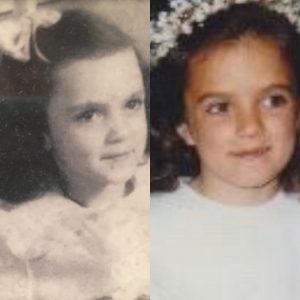
Born 55 years apart, my grandmother (left) and I (right) looked a lot alike as children.
- What kinds of things did your family do together when you were young?
On Sundays, we would go and visit grandparents and aunts and uncles. It was usually a Sunday because people worked on Saturdays back then. Some people were off every other Saturday. My dad worked at Southwestern Bell Telephone Company for half a day on Saturdays until they changed their contract to a five-day workweek in 1935.
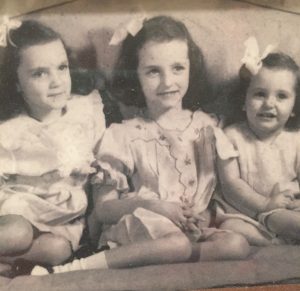
Nancy (left) and her sisters, 1930s
2. What are your memories of your grandparents (born in 1880s)?
We lived with my step-grandpa for a while when I was little. He would leave tiny milk bottles at my bedroom door in the morning, pretending to be the milkman, and we always really liked that. He babysat for me one time when I was a baby, and back then they thought that you shouldn’t give children fruit until they were older. But one day he had a watermelon and gave me some. That evening, he got in trouble for giving me watermelon, and in the coming years, whenever I started to cry, he said “Hey, didn’t I give you watermelon?” and then I thought, “Oh yes, he did give me watermelon. I shouldn’t cry” and stop.
3. What did you do with your friends when you were a kid (1930s)?
We played games like Red Light Green Light, Swing the Statue, (a kid swung you around and you were supposed to look like the statue they suggested), Rock School, Mother May I and Fly Sheep Fly (the leader (shepherd) would hide all the kids and the person who was “it” would have to go find them, using a map that the shepherd had drawn on the path he had taken to the hiding place). There was also a haunted house up the street during the depression and some hobos lived there. We always heard people there when we were playing. We also liked to catch flies in the abandoned house and then make fly soup, putting the flies in the water and stirring and stirring it.
Nancy is on the bottom right, seen with her sister Pat, half-sister Sondra and cousin Martha
4. Do you remember much about the Depression?
Yes, people didn’t have a lot of things. One kid that we played with had a radio and most people, us included, didn’t have one yet, so all the kids on the block would sit on their front porch to listen to our Saturday shows, like cartoons. The radio was inside and we would listen to it through the windows. No one played inside each other’s houses because the mothers wanted to keep the houses clean. Our favorite radio show was Uncle Ted, which was a show for kids. But he ended up losing his job because one time after he finished his show for the day, he said “That will hold the little monsters for awhile”, not knowing he was still on the air!
1930s Family Listening to Radio
5. What was your house like growing up?
We got a radio before I turned six. We had an icebox and the iceman used to come bring a big block of ice for it every other day. You could ask him for ice on hot days – he would then throw a big piece onto the street to break it and we would eat it. Horses brought the ice wagon and the milk wagon. Before we had a vacuum, we would pour salt on the carpet to get dust out and then sweep the carpet.
6. Why did you go to boarding school and what was it like (1942)?
My mom died when I was a baby, and after a few years with a new step-mother and half-sister, my dad’s second wife ended up leaving for Hollywood to try and become an actress. My dad eventually remarried and his new wife thought it would be good for my sister Pat and I (then aged 13 and 11) to go to boarding school. We hated it. We were allowed to come home on the weekends and every week we would count down the hours until Friday. We had a washbasin next to our beds and we would have to fill it up the night before. Sometimes it was freezing cold and there would be frozen pieces of ice around the washbasin when you went to wash your face in the morning. The bed had a straw mattress and when you got up, you had to turn your mattress over and take your bedding off. Nobody liked it there and everyone was trying to escape. We would help kids smuggle out clothes on Fridays because they weren’t planning on coming back Sunday night and didn’t want to tell the nuns. One Sunday, I went to the show (movies) and ran into a classmate from my old grade school. He said if I stayed until he was ready to leave he would buy me an ice cream cone on the way home (even though it was December!). So I stayed. By the time he was ready to leave, it was dark and everyone was looking for me. They thought I had run away because I didn’t want to go back the boarding school, so, even though that wasn’t my intention at that point, my dad realized how much we hated it and told his new wife that we would be coming back home.
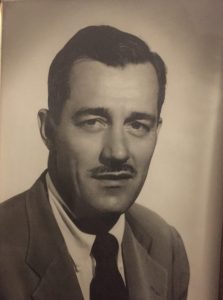
Nancy’s Father, Jim
7. What was the biggest trouble you ever got in?
We did anything to be annoying when we were at boarding school. I purposely tried to get kicked out. I would slide down bannisters and lean on the chairs to tip them forward, which was against the rules. One time, since I knew the nuns read our mail before sending it, I wrote a letter to my dad and said that all the kids hate this school and they’re all going to quit. The nuns came into study hall later that day to get me and send me to the principal. But the principal didn’t punish me – she just said that she didn’t like the school either!
A 1940s-Style Classroom
8. Did you have any good memories from boarding school?
When the St. Louis Cardinals won the World Series in 1942, we got to walk down to Grand Avenue to buy a soda, which cost a nickel.
9. How did World War II affect your life (age 10-14)?
All males in family that were draft age were gone – all my cousins and uncles. My dad didn’t have to go because he fell under the category of “one surviving parent”. We worked hard. We did newspaper drives, scrap drives and knitted for the Red Cross. Girls in the neighborhood got together on Friday nights and we’d have our meetings and report on what we’d done that week. When we were ten or so, we would also play “spy”. We spied on anybody that had a German-sounding last name, looking in their windows to see if they were doing anything suspicious. We especially wondered about the shoemaker and the baker…
10. How did you meet Grandpa (1940s)? I met him on a hayride in eighth grade, but just briefly. A few months later, I was walking down the street where he lived and he was out in his front yard, raking leaves. I was really embarrassed because my sister Pat had actually borrowed a pair of his jeans from his older sister Pat, and I had taken those same jeans from my sister to wear that day. So when I walked by him, I was actually wearing his jeans! And he barely knew me! I tried to walk really fast so he wouldn’t see me, but he saw me and said hi. I said hi back and kept walking as fast as I could. But he wondered who I was and eventually got my number from his sister. He called me later on and asked me to his high school dance. Then we dated off and on in the following years, becoming exclusive his sophomore year of college.
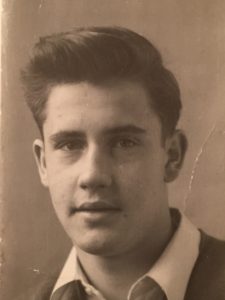
My Grandfather Don
11. What were the first few years of married life like for you (1950s, living in California due to a navy posting)?
It was fun. No one had a lot of money, though. One time, Grandpa had asked his uncle and and a high-ranking navy friend for dinner, but we didn’t have enough money to buy food for a nice meal. We said a prayer before we went to bed, and planned to pawn our camera for money the next day. However, when we woke up, it was like our prayers had been answered – we went to open our mail box, and found a check from a priest back home – he had sent it to us for a wedding present! We were thrilled and were then able to buy a roast with the money.
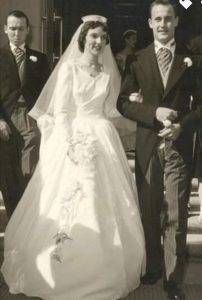
Don and Nancy at Their Wedding, 1954
12. What was it like being a navy wife?
Most the officers and navy wives had calling cards. They would come visit you, put their calling card on a silver tray you were supposed to have sitting out for that purpose, and then you were supposed to return the visit and put your calling card in their tray. We didn’t have the money for cards and silver tray, so when the commanding officer came to visit, he put his card in an ash tray. I played bridge with the other navy wives. My best friend was Betty from Chicago. We had a television and they didn’t, so they’d come over and watch shows with us.
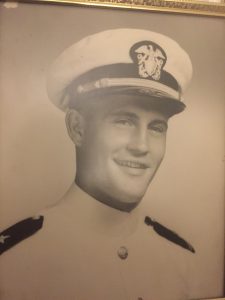
Don in his Navy Uniform, 1950s
Today, Nancy is the matriarch of our extended family, which consists of her ten children, their spouses, twenty-seven grandchildren and even one great-grandchild. Although her days of fly soup-making and shoemaker-spying are long past, her stories live on in the hearts of all her family, inspiring us all to appreciate things like watermelon, vacuums and ice cubes a little bit more.
Nancy, bottom left, with her entire family in 2015

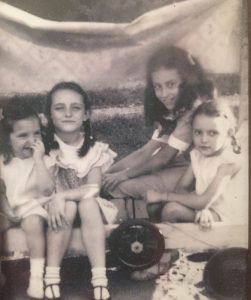
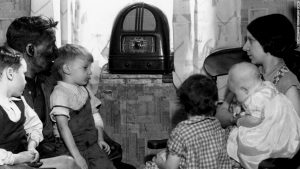
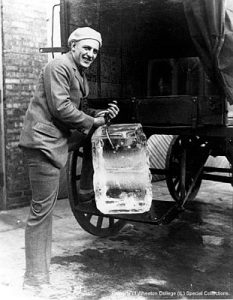
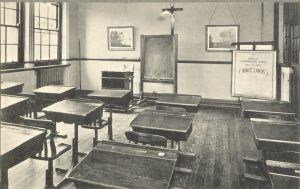
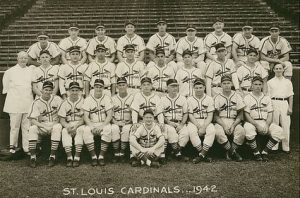
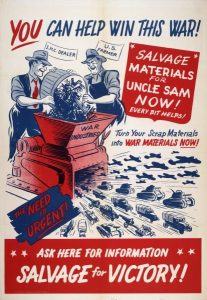
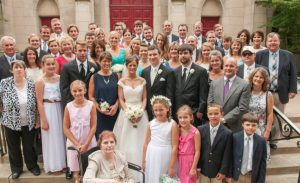
2 Responses
How interesting to find out a similar-in-age woman from another part of the country had almost the same childhood experiences. I love the 1930-1940 years. We could walk at nights, ride the buses anywhere without fear, played outside until the bugs began to bite in the summertime.
Thank you for the interview.
Thanks for reading Vivian! It does sound like a wonderful time.